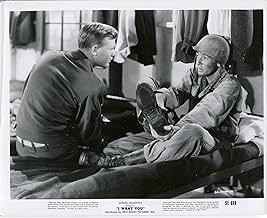Aggiungi una trama nella tua linguaIn 1950, small-town Americans try to deal with military conscription.In 1950, small-town Americans try to deal with military conscription.In 1950, small-town Americans try to deal with military conscription.
- Candidato a 1 Oscar
- 1 candidatura in totale
- Train Porter
- (non citato nei titoli originali)
- Draft Board Secretary
- (non citato nei titoli originali)
- Radio Baseball Announcer
- (voce)
- (non citato nei titoli originali)
Trama
Lo sapevi?
- BlooperJack should have had a regulation haircut.
- Citazioni
[Arriving home with her husband after sending the youngest of their three sons off to the Korean War, Sarah begins trashing the husband's WWI shrine.]
Sarah Greer: Liar! Crazy, crazy liar! You never were in any one of those places and you know it. You never heard a shot fired. You were in Paris all through the war, shining up a general's boots, bringing him bicarbonate of soda when he'd drunk too much the night before. I went along with you; I thought it was childish, foolish, but I didn't think it did any harm. I thought if it made you feel any better to pretend you'd won the war alone, who did it hurt? But then I saw something: when your son Riley was killed
[in WWII]
Sarah Greer: , you were proud. And Martin was missing for four days in France; it made you feel important. You were a big man in Iverson's bar for an evening. Well, that's all over. You can take all this junk right back where you captured it with your own two hands, back to the pawn shop on Sixth Avenue in New York. As of this evening, there are no more professional heroes in this house.
a) this movie looks at the beginning, not the end of a war - at the trepidation, the dislocation and sacrifice -- not the sweet relief of an ordeal over and the prospects for improvement in one's welfare; and
b) like all wars America has been in since W.W.II, Korea was not a "total war" (engrossing and engulfing the lives of all in the country) but instead one in which a peacetime prosperity and security continued for those at home while a relative handful out of the American population bore the entire brunt.
These factors produce a very different movie than Best Years - a movie of families riven by conflict over the disparity of the sacrifice, over whether to seek to avoid that sacrifice, over basic feelings about what is personally owed to the country (rather than self or family), and over the pride or shame in participation in a war.
The movie seethes with conflict and bad blood - often unspoken. The conflicts arise over deeply felt divisions in social class, in gender and in generation, and result in unspoken accusations of callousness and cowardice, vanity and selfishness.
In many respects this is a movie of another time - these days, unless a family has a strong military tradition, I can imagine few families now enraged by a son's expressed wish that a war could be won without his involvement, few families in which an employer would not draft a letter for his decades-long employee's only child to keep him out of war - and even refuse to write a letter (for which his mother pleads) for his own beloved brother's draft deferment.
One sees many views of war and patriotic obligation in this movie: views that deeply clash with one another, views that are expressed with strong emotion and that upset others.
The only comparable scene in Best Years of Our Lives is the darkest - the scene with Dana Andrews and the cynical customer at the soda fountain. Best Years is a far warmer and more optimistic movie (despite the predicament of the protagonists). In Best Years, one always senses that one day, there will be a workable re-adjustment.
In "I Want You", one has no such assurance - and it contributes to making this very realistic, often grim, and altogether fascinating.
I più visti
Dettagli
- Tempo di esecuzione1 ora 42 minuti
- Colore
- Proporzioni
- 1.37 : 1
Contribuisci a questa pagina




































